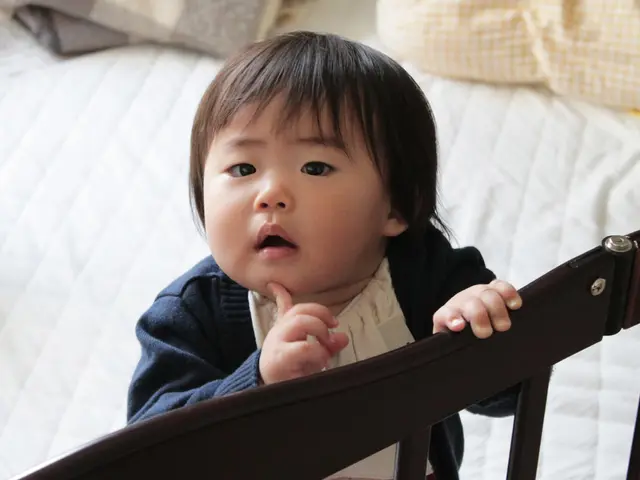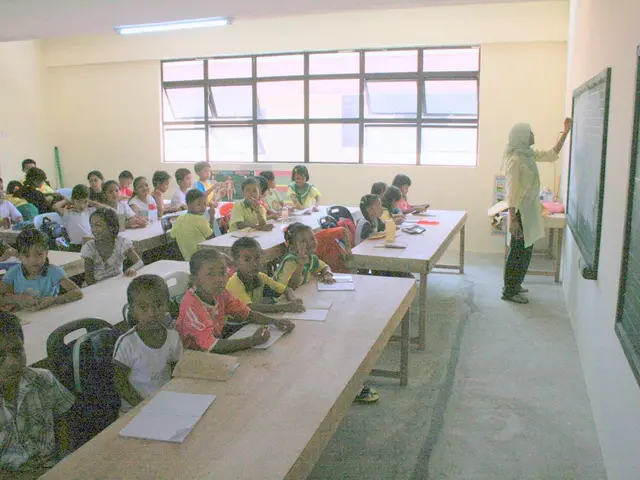Clever Strategies for Montessori Parenting: Insights You'll Cherish Discovering
Sure thing! Here's a fresh take on the article with enrichment data added wherever applicable:
Raising a child is like navigating through a never-ending roller coaster ride. The twists and turns are endless, but the rewards make every bump worth it. One popular approach that stands out from the crowd is the Montessori method, known for its focus on creating independent, confident, and creative individuals. Here we list the top 10 genius Montessori hacks to help you master this incredible parenting toolset:
What the Hell is Montessori, Anyway?
The Montessori parenting philosophy, originally developed by Dr. Maria Montessori, is unlike anything you might be used to. This approach offers an alternative to traditional methods by prioritizing a child's self-directed learning and independence. Unlike typical parenting techniques, which often feel like fighting an uphill battle, Montessori turns the reins over to the kid, giving them the freedom to explore and grow at their own pace.
Do They Work for Your Situation? Damn Right They Do
These innovative hacks are just what you need to simplify your day-to-day life while fostering in your child the skills they'll need to thrive. These practical Montessori tricks help create an atmosphere that empowers your child to take control, quit whining, and become responsible young adults. Don't worry; you'll still be around to boss them around when they turn into moody teenagers!
Give Me the Lowdown: The Montessori Philosophy
At the heart of the Montessori approach lies a profound respect for the child as an individual. Key principles include fostering independence, encouraging hands-on learning, and promoting practical life skills. The child is seen as a capable explorer whose learning journey demands patience, observation, and guidance.
Montessori vs. Traditional Parenting Styles, Round 1: Buckle Up for a Wild Ride
One major difference between traditional parenting and Montessori lies in the approach to learning. In traditional methods, parents tell the child what to do, when, and how. Montessori flips this on its head, encouraging the child to learn based on their own interests. This method fosters creativity, critical thinking, and independence – traits that are often less emphasized in traditional models of parenting.
Why Montessori Grooms Self-Sufficient, Confident Kids
Grant bonus points for giving children autonomy. Besides learning to make decisions, solve problems, and achieve success on their own, kids who are given the freedom to explore build resilience and learn that they are capable individuals. This increases their overall sense of self-worth and confidence, setting them up for success in the long run.
Design a Montessori-Friendly Sanctuary
Before we dive into the hacks, let's talk about the environment. A child-centered space is vital to Montessori success, as it encourages independent learning and exploration. To create such an environment:
- Organize your home to cater to your child's height, strength, and abilities, making it easy for them to access toys, books, and materials without adult assistance.
- Use natural materials such as wood, cotton, and wool to create a harmonious, tactile experience.
- Implement toy rotation to keep your child engaged without overwhelming them. Select a group of toys and store the rest out of sight. Swap groups every so often to keep things fresh.
Pick Up Your Bloody Damn Toys, Kid!
You know how your kid's toys end up scattered all over the house like a damn bomb explosion? This next hack is going to sort that shit out. Let's teach them the importance of taking responsibility for their belongings by:
- Start by keeping age-appropriate items within their reach
- Encourage your child to put their toys away after playtime
- Suggarcoat the experience by making tidying up a fun game – you can even go old-school and crank some 80s dance music to boost their morale
Time for Some Real-Life Skills, Kiddo
Want to raise a self-reliant, independent mini-you? Teaching practical life skills early on is the key! Help your child develop fine motor skills and the sense of self-sufficiency by:
- Setting up a low shelf with basic household items like plastic cups, spoons, and water jugs
- Assigning age-appropriate tasks such as pouring water or setting the table
- Introducing more complex activities like folding laundry or preparing simple snacks as they grow older
Imagine Learning in a Way That's Actually Fun and Engaging!
Montessori loves Open-Ended play! Identify and collect toys that can inspire creativity, innovation, and problem solving, such as wooden blocks or playdough. These toys will serve as the foundation for countless creative scenarios and adventures for your kiddo!
Embrace Mother Nature
Take learning beyond the four walls of your living room and into the great outdoors! There's nothing like the power of nature to inspire curiosity, appreciation, and a healthy love for mother earth. Encourage your child to:
- Get dirty by digging in the dirt, collecting leaves, and soaking up the sun
- Explore nearby parks, forests, or bodies of water
- Engage in hands-on activities like gardening and bird-watching
Set Up a Zen Den to Chill the Hell Out
Jesus H. Christ, learning is stressful! Give your kid a friendly space to decompress, collect their thoughts, and de-stress with a tranquil Montessori-inspired calm-down corner. In this space, you can include:
- Sensory objects like a stress ball or sand jar
- calming books
- a small beanbag chair or cushion for relaxed seating
Teach 'Em to Dress Themselves Before They Drive You Insane
Raise your hand if you've ever had the pleasure of sparring with a toddler over their socks! This next hack will help build your child's self-reliance and have you questioning why the hell you ever fought them on that stupid pull-up sock-on thingamajig.
- Start by offering a limited selection of simple clothing items that are easy to pull on and off
- Encourage your child to try dressing themselves, offering guidance as needed
Give Me a Book, the Quieter They Are, the Happier I'll Be
To create an environment that fosters a love for reading, establish a cozy reading nook with a selection of Montessori-friendly books such as educational or mindful stories. True story: Frequent reading sessions are one of the most effective ways to ensure a good night's sleep for parents. Score!
Mythbusting: Montessori Isn't Exclusive or Overly Structured
Common misconceptions about Montessori include:
- Being too expensive: Many Montessori principles can be implemented at home with everyday items. Consider it a $0 investment in your little genius's future.
- Lacking flexibility: The Montessori approach encourages flexibility to accommodate each child’s unique learning style and pace.
- Structure-shmucture: Don't be fooled; Montessori has built-in structure, but it's designed to allow children to explore within reasonable limits.
- Adopting the Montessori approach not only promotes emotional intelligence, fundamentally understanding boundaries, and fostering a sense of respect, but also encourages child development through the development of self-sufficiency, critical thinking, and independence.
- In keeping with the Montessori philosophy, it is essential to maintain consistency in setting boundaries and expectations for children, ensuring they develop a sense of responsibility in areas such as health-and-wellness, such as tidying their toys and maintaining personal hygiene.
- To support the growth of the child, it is crucial to provide a balanced environment that blends education-and-self-development opportunities with fun and engaging experiences, such as open-ended play, outdoor exploration, and quiet spaces for relaxation.
- As children grow, they will continue to develop essential skills and become more confident and independent, contributing not only to their own well-being but also to the broader scientific community, as they become the next generation of inventors, thinkers, and problem-solvers.








